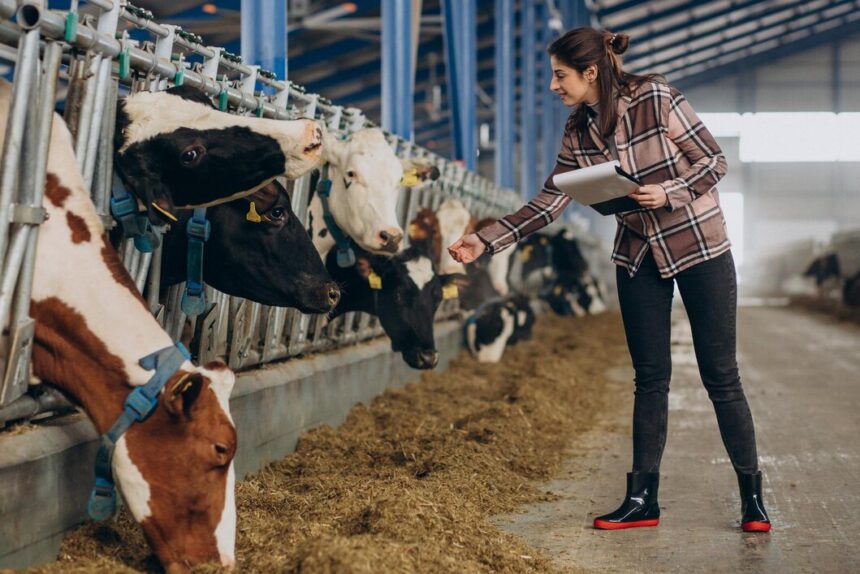Ethical farming practices prioritize the well-being of animals, recognizing that the health and happiness of livestock contribute not only to the animals’ quality of life but also to the overall success and sustainability of the farm. Implementing ethical practices in animal husbandry is both a responsibility and an investment in the future of agriculture. Here are practical tips for optimizing animal welfare on farms.
1. Provide Adequate Shelter: Shielding from Elements
Ensure that animals have proper shelter to protect them from harsh weather conditions such as extreme heat, cold, or rain. Well-designed shelters should allow for ventilation and comfort while offering protection from the elements.
2. Access to Clean Water: Hydration is Key
Maintain a consistent and accessible supply of clean water for all animals. Regularly check water sources to ensure they are free of contaminants, and monitor water quality to safeguard the health of the livestock.
3. Balanced Nutrition: Tailored Diets for Health
Develop well-balanced and nutritionally sound diets for each type of livestock. Consult with veterinarians or nutritionists to create dietary plans that meet the specific needs of the animals, promoting their health and preventing nutritional deficiencies.
4. Adequate Space: Room to Roam
Provide sufficient space for animals to move, graze, and express natural behaviors. Overcrowding can lead to stress and aggression among animals. Tailor living spaces to the specific needs and habits of each species, allowing for a more comfortable and harmonious environment.
5. Regular Veterinary Care: Health Monitoring
Establish a routine veterinary care schedule for the animals. Regular health check-ups, vaccinations, and preventive treatments are essential for maintaining animal well-being. Promptly address any signs of illness or distress to prevent the spread of diseases within the herd or flock.
6. Humane Handling: Minimizing Stress
Implement low-stress handling techniques to minimize anxiety and fear among the animals. Gentle and patient handling during tasks such as herding, loading, and transportation helps reduce stress levels, contributing to better overall welfare.
7. Enrichment Activities: Stimulating Minds
Promote mental stimulation and prevent boredom by incorporating enrichment activities. These can include providing toys, structures for climbing or scratching, and varied terrain to encourage natural behaviors and mental engagement.
8. Disease Prevention: Biosecurity Measures
Establish strict biosecurity measures to prevent the introduction and spread of diseases. This includes quarantining new animals, maintaining cleanliness in living areas, and limiting human and equipment movement between different sections of the farm.
9. Comfortable Bedding: Ensuring Restful Sleep
Offer comfortable bedding to ensure animals have a clean and soft surface for resting. Proper bedding helps prevent injuries and provides a more hygienic environment, contributing to better overall animal welfare.
10. Consider Animal Behavior: Understanding Needs
Familiarize yourself with the natural behaviors and social structures of the animals under your care. Understanding their instincts allows you to create environments that cater to their needs, fostering a more natural and contented life.
11. Responsible Breeding Practices: Avoiding Overpopulation
Practice responsible breeding to avoid overpopulation and ensure that all animals born on the farm have a purpose and can be properly cared for. This contributes to managing resources efficiently and preventing unnecessary stress on the animals.
12. Continuous Learning: Staying Informed
Stay informed about the latest advancements in animal welfare and farming practices. Attend workshops, engage with industry experts, and invest in ongoing education to continually improve the well-being of your livestock.
Optimizing animal welfare on farms requires a commitment to compassionate and ethical farming practices. By providing proper care, shelter, nutrition, and veterinary attention, farmers can ensure the health and happiness of their livestock. Implementing these practical tips not only meets ethical standards but also contributes to the overall success and sustainability of the farm, fostering a positive and harmonious relationship between humans and animals in agriculture.







